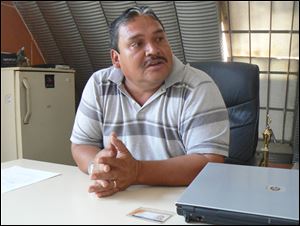
SCAVENGING FOR HOPE
Strides made to boost Guatemalan workers' health, safety in
7/3/2011
Rigoberto Carias, operations manager, says access to the dump has been decreased by issuing of credentials. About 1,400 have such permits, which cost $6 a year. The fee goes to research on dump workers.
GUATEMALA CITY -- Making a living by scavenging through piles of trash has never been easy, but it's better now than it used to be, according to Rigoberto Carias.
Mr. Carias, the operations manager of the city dump for seven years, said in an interview in his landfill office that officials have made significant improvements in job safety and worker health.
"Since 2005, no women six months pregnant and no minor children 18 or under are allowed to be in the dump," Mr. Carias said.
This has been achieved through the issuing of credentials, he said. Guatemalans must provide an official government document that they receive when they turn 18 in order to receive credentials to work in the dump as a reciclico, or recycler.
Mr. Carias said rare exceptions are made in some cases, such as those teenagers who apply for work and have good recommendations from other workers.
"We'd rather let them work here than be on the streets or in gangs," Mr. Carias said.
PHOTO GALLERIES:
Life in Guatemala City Ghettos
St. John's Visit to Guatemala Schools
RELATED ARTICLES:
Guatemalan laborers get help from Toledo
St. John's students serve as role models in Guatemala
In 2004, with help from International Samaritan, the dump opened a medical clinic with a full-time, experienced nurse.
"We used to have a full-time doctor, but she had a baby," he said.
The clinic treats minor injuries, provides cancer testing, and works with young women to teach family planning, he said. For more serious accidents, the nurse can provide first aid until an ambulance arrives.
About 1,400 people have been issued credentials, he said. They cost about $6 a year, and the fee goes to the University of San Carlos for its ongoing research on dump workers.
The number of reciclidores has been reduced in recent years.
A wall was built a few years ago to control access to the dump, which covers 750 acres in the center of the capital city of 1.5 million people.
Trash is brought in from a 50-mile radius, with 650 trucks dumping 6,000 tons of garbage a day.
Dump officials have made progress in preventing avalanches and fires, Mr. Carias said. The trash is now compacted into cells 8 to 10 yards high that are strong enough to support 30-ton bulldozers.
The compacting makes trash cells sturdier than they were in the past.
"Avalanches are a problem we think we have solved," Mr. Carias said. "We have had no avalanches for two years."
The trash cells are covered over quickly with dirt and mud, before the garbage begins to rot, he said. That has reduced the offensive smell and virtually eliminated the swarms of flies that had plagued the surrounding area.
Each trash cell is monitored and methane gases are piped out of the cells and burned off every 70 days, preventing buildups and possible explosions, Mr. Carias said.
When air traffic officials complained that vultures posed a threat to aircraft, city officials decided to have all animal carcasses and carrion dumped into one specific area of the landfill to narrow the area for vultures to roam.
Mr. Carias said dump workers bring their own meals to work and some restaurants set aside and deliver excess food to the reciclidores. He denied that they eat food from the trash, although some workers admitted there were times when they were desperate enough to eat food that they found in the dump.
The operations manager acknowledged that some people live in the dump illegally. Lean-tos and tarps can be seen both inside the dump and in the wooded slopes surrounding the landfill.
"These people have no place else to go. There is police surveillance here. They won't be mugged. It's pretty safe," Mr. Carias said.
The business of workers scavenging at the dump would come to an end if Guatemalans sorted recyclables at home, as is done in many nations.
"This is rudimentary recycling. Everything is done by hand. We don't have a culture of recycling here," Mr. Carias said.